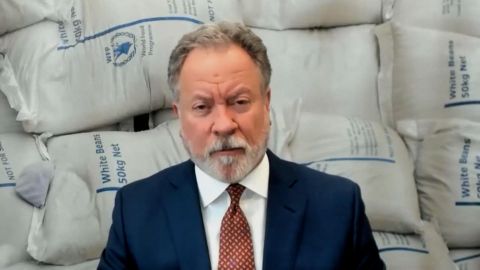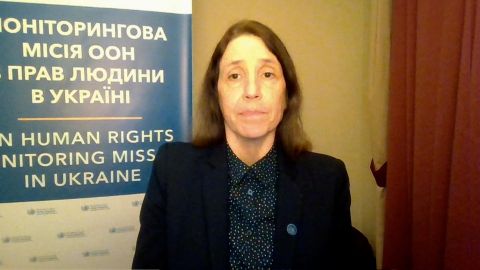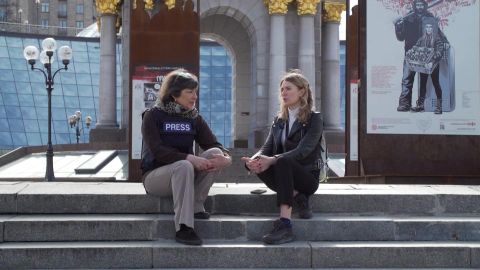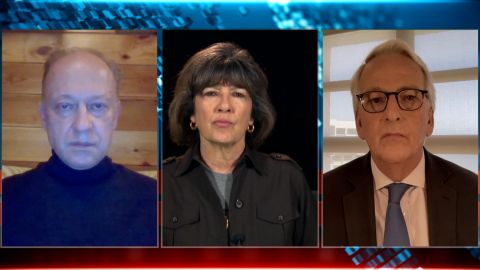Read Transcript EXPAND
CHRISTIANE AMANPOUR (on camera): Now, according to the UNCHR, the refugee high commissioner, almost 4 million Ukrainians have now fled the country. Yet, the repercussions of war may lead to mass migration beyond its borders. Once known as the bread basket of Europe, Ukraine and Russia supply the world’s 30 percent of wheat and barley. Now, not only is its own food supply chain fractured, but global food security is also under threat. David Beasley is the executive director of the World Food Programme and he shares his concerns with Hari Sreenivasan about this issue and why countries must act now.
(BEGIN VIDEO CLIP)
HARI SREENIVASAN, CORRESPONDENT: Christiane, thanks. David Beasley, thanks so much for joining us. First, I want to start with Ukraine and what you witnessed there and in Poland and just give us a sense of the hunger on the ground and then, we’ll kind of have a larger conversation from there.
DAVID BEASLEY, EXECUTIVE DIRECTOR, WORLD FOOD PROGRAMME: You know, everybody’s been so focused, in many ways this is good, on the refugees that have left the country. And quite frankly, they’re the lucky ones, they’re out of harm’s way, they’re being received in loving arms by strangers and family and friends, whether it’s in Poland, Romania, Moldova, wherever it may be and they’re getting food and shelter and relocation for, hopefully, a short-term, temporary basis. But you take that 3.5 million people out of the equation, then you still have 40 million people inside Ukraine that are struggling to get food because of the supply chain system, the commercial systems are broken down, as you can imagine. Certain cities are besieged. There are pockets of starvation now. And so, what we’re trying to do is reach the people hardest to reach throughout the country. In fact, we just reached a million people this week. We plan to scale that up over the next 30 days to 2.5 million people. By — in May, we hope to reach 4 million people. In June, we hope to reach 6 million people. But imagine an entire country, this is not a small place, this is a massive, large country in trying to reach the people at a time like this when all of the — most of the people on the front lines battling is a very, very complicated dynamic that we’re facing.
SREENIVASAN: You know, I don’t think that most people understand how just logistically this works too. I mean, in the middle of conflicts or when there are active conflicts going on, you as an agency have still tried to figure out ways to get food into people. So, in the middle of a war, when we see pictures of Mariupol, we see pictures of the bombings, how does the World Food Programme get aid in?
BEASLEY: Well, sadly, 80 percent of our operations in our world are in war zones, in areas of the conflict. That being said, we’ve got the experience and expertise to threat that needle, find those openings, to reach the people in need. And so, in a place like Ukraine where the battlefront is changing, it’s a very fluid situation, we’re moving supplies around as we speak. And you can imagine, we’re putting distribution points, warehousing all over the country, not all our eggs in one basket. And so, sometimes, for example, you might be in a war where you can do airdrops or airlifts. Well, you can’t do airdrops and airlifts in Ukraine right now because the airspace is completely shut down. Now, I have made requests to be able to do that so we can deconflict. But one of the important elements that we do, Hari, is that we do deconfliction between warring factions. And most of the time, that works fairly well. Take for example in the Syrian war, we would deconflict between, you know, the Syrian forces, Russian forces and other forces on the other side. And we would say, all right, on Thursday between, you know, 10:00 a.m. and 2:00 p.m., we got convoys coming through. Everybody, stand down. And we usually make that happen. This war is in its initial stages and we’re not where we want to be at this stage. We’re not able to reach the people we want to reach. We’re reaching a lot of people. But you know, try telling that to that person whose whole entire family hadn’t gotten food in three weeks. Now, fortunately, in Ukraine, people had a lot of food in their pantries. They had a lot of food already in their stores. And so, they’ve had two or three weeks where they could survive. But now, they’re running out of that coping capacity and we’ve got to reach them however we can.
SREENIVASAN: Let’s talk a little bit about not just getting food in, but getting what Ukraine represents in terms of global agriculture out. Because there’s a war on, what is the ripple effect of the type of food Ukraine produces and the rest of Europe and the world?
BEASLEY: You know, before the Ukraine war broke out, we were already facing a perfect storm. And I had already been communicating to world leaders that fuel prices were going up before the Ukraine war. Food prices were going up. Shipping costs were going up. We were billions of dollars short. We feed about 125 million people on any given day, week or month in places that if we are not there you will have starvation, or you will have destabilization, more conflict and mass migration. So, I had already been, the sky is falling and the sky is falling before the Ukraine crisis. And then, all of a sudden, you go back and you had Ethiopia, then you had Afghanistan and now, you’ve got Ukraine. And so, it’s more complicated now. And the question is why? Because the bread basket of the world is Ukraine. We buy 50 percent of all of our grain from Ukraine. Russia and Ukraine together produce 30 percent of all the world supply of wheat. 20 percent of all the world supply of maze, corn. 75 to 80 percent of world supply of sunflower oil for cooking purposes. And you compound that with the fact that Belarus and Russia produce, I think, more than any other country on earth the base products for fertilizers. So, now, Ukraine produces enough food to feed 400 million people per year. Now, start adding all this up with fuel pricing and costing just on the World Food Programme, our operational costs is going up over $70 million per month. So, almost a billion dollars. That means, if I don’t get an extra billion, who am I going to take food from? Am I going to take food from a child in Chad or Ethiopia to feed a child in Ukraine or take a food from a child in Syria to feed a child in Afghanistan? And now, we’re taking food from the hungry to give to the starving because we don’t have enough money around the world. We are already — and this is horrific figures. Chad, Niger (ph), and I could keep going. 50 percent rations (ph) now. Yemen, where we feed about 13 million people on any given day, we have now cut rations for 8 million over about a month ago down to 50 percent. Next week, unless we receive funds that we need, we will be cutting that down to zero. We don’t have the monies that we need. So, all of this compounding is affecting our operation. But, Hari, here’s the fear, in addition to this catastrophe on top of the catastrophe is this, food supplies have not been a problem. There’s been a pricing problem. But now, in the fall, you could have a pricing problem and a supply problem. Why? Because Ukraine and Russia, if their wheat is not available — and guess what? The farmers who need to be planting corn over the next 30 days, guess where they are? They’re on the front lines. They need to be harvesting their grain, their wheat in June, July. Well, guess where they are? The truck, the tenders to the farms, guess where they are? And so, if this war doesn’t get resolve quickly, you’re going to have catastrophe on top of catastrophe.
SREENIVASAN: So, I wonder, you know, I’m in a position of privilege here where around the corner there’s a grocery store, their shelves are still full. So, an American, I might not feel the type of pain that you’re describing. But basic economic says, if there is a limited supply of something, the price of it goes up. And by this fall, if there’s going to be less wheat in the system, the costs of what’s at my grocery store increases. But I also imagine that everyone who is making that is essentially competing with the likes of you for that same grain.
BEASLEY: People of wealth, people who have decent jobs, they’ll be fine. But the people who are living on the edge, whether it’s in America or anywhere else in the world, it will be literally horrific for them. And the countries that I primarily operate in, which are the poorest countries on earth, they live on edge already. They live from hand to mouth every day. And so, when you begin to look like Egypt who gets 85 percent of this grain from the Ukraine area. Lebanon, 80 percent of its wheat for bread came from — in 2020, from Ukraine. So, you can imagine what’s go to happen. And surveys and studies and history have proven when food prices starts spiking, going up, people get restless and you have destabilization. So, this is what the world has got to look at, particularly for the European community and the American community. Everybody is focus on the refugees coming from Ukraine, but if you ignore the people down in (INAUDIBLE) and Ethiopia and Sudan, South Sudan, Yemen, Syria, Lebanon, Jordan, you could have dozens of millions coming to Europe from the south and the southeast. The United States, we are already looking at horrendous problems on pricing, flash flooding and droughts down in Central America, Guatemala, Honduras, El Salvador. We are doing surveys now that show that people, many, many more people are talking about migrating because they don’t have stability, they don’t have food security, and what else are they going to do?
SREENIVASAN: One of those statistics that startled me when I was looking at some of this was that the number of t hose facing acute food insecurity has more than doubled since 2019 from 135 million to 276 million people. It also says that 44 million people in 38 countries are on the edge of famine. If you can’t feed your family, you’re going to do anything you can to change that.
BEASLEY: People don’t want to leave home. I can tell you that as we feed over 125 million people in over a hundred countries, people won’t — and they don’t want to leave home. But if they don’t have food for their children, they’ll do what they have to do. All of us would as moms and dads and parents. And so, when I took over World Food Programme back in 2017, there were 80 million people marching towards starvation. Not chronic hunger. That’s a whole different ball game. I’m talking about people who don’t know where their next meal is coming from. They’re in acute food insecurity. 80 million, that number jumped right before COVID from 80 to 135. And the question would be, why? Well, the simple answer was manmade conflict, number one. And number two, climate shocks, climate change. Well, COVID comes along. It just economic ripple devastation, especially to the poorest countries on earth. That number then jumped from 135 million to 276 million people marching towards starvation. And, Hari, as you mentioned, out of that 45 million of those people in 38 countries are on famine’s door as we speak. So, you break down those 38 countries, we can tell you which countries very well, not who have just famine, they’ll have destabilization and mass migration. And it’s a thousand times more expensive to address the problem after the fact than it is to come in before the fact. The numbers are astounding. For example, in the Syrian crisis. We can feed a Syrian in Syria for about 50 cents a day, and that’s a war zone. If that same Syrian is forced to leave, and they don’t want to leave, and let’s say they end up in Berlin. The humanitarian support package per day in Berlin is $70 a day.
SREENIVASAN: It may be a philosophical question here, but is this a case that we don’t have enough food on this planet to feed people or that we are prioritizing different things over feeding everyone?
BEASLEY: There’s enough food on the planet to feed anyone. In fact, there’s more than enough. It is strictly a money issue. We have to choose which children eat or which children don’t eat or which children die, which children die. How would you like that job? And it’s not fair to us to — particularly when there’s $430 trillion worth of wealth on the earth today. And at the height of COVID, the world’s billionaires — and I’m for people making money. Please don’t misunderstand me here. But they have a moral obligation to share that wealth in times like this. And at the height of COVID, the world’s billionaires, on average, net worth increase, net worth increase per day was over $5.2 billion. All we need is a couple of days’ worth of your net worth increase to bring peace and stability to millions of people around the planet. In fact, we’re going to be doing a press conference today in South Carolina. We’re bringing together some Democrat, Republican governors and appealing to high-net-worth individuals at a time like this when the world is at a perfect crisis, governments are tactile because they’ve been responding with, you know, economic stimulus packages of COVID and all the different dynamics, it’s time for the wealthiest of the wealthy to step up and say, we care about the people on earth. And I don’t think that’s too much to ask.
SREENIVASAN: What happens if this fund-raising doesn’t work? If you remain short?
BEASLEY: It’s not complicated at all. Children will die. People will die. Clearly. Simply put. And we are already cutting rations, families and children around the world because we are shorter billions of dollars now because of this perfect storm. And people think, well, that’s over there. No. Number one, if you’re not going to do it out of the goodness of your heart, hell, you better do it out of your national security interest. Because I can tell you, what we’ve seen from experience, you will have destabilization of nations and there will be military conflict, which is a thousand upon thousands of times more expensive. And you’ll have mass migration. And that is at least a hundred to a thousand times more expensive. There’s no free lunch here. You’re going to pay for it one way or the other. If you go out and address root causes and get ahead of it, it’s a lot cheaper than waiting after the fact. And if you’re not going to do it morally, do it out ever your national security interest. So, don’t hesitate to reach out to your congressman, Republican and Democrat, and express your hopes and your concerns that we’ve got to do something here. Number two, as an individual, whether it’s online at wfp.org or sharethemeal.org, give a dollar, $5, $100 or your organization you might be involved with, a church or a mosque or whatever it might be, please be engaged and be involved. And also, the private sector in the corporate world from, yes, we want your engagement, yes, we need your money right now, but we need you to be involved with us and countries around the world.
SREENIVASAN: Governor David Beasley, executive director of the World Food Programme, thanks so much for joining us.
BEASLEY: Thank you very much.
About This Episode EXPAND
Ivo Daalder and Andrey Kortunov discuss what the parameters of an end to the war in Ukraine might look like. Matilda Bogner, head of the UN Human Rights Monitoring Mission in Ukraine, gives an update on casualties. David Beasley, Executive Director of the World Food Programme, explains how the war could push millions around the world to starvation.
LEARN MORE



